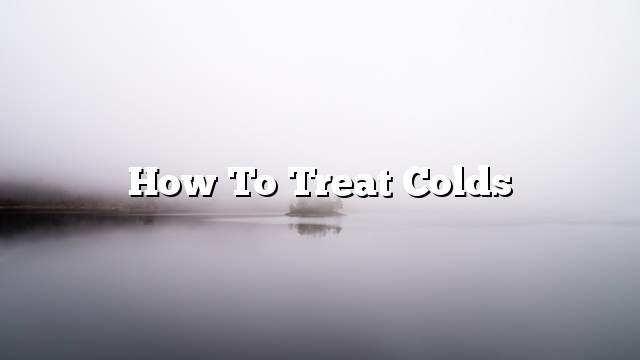Colds
Common cold is the most common infectious disease, and occurs as a result of a high respiratory tract infection. Colds are infectious diseases that can be transmitted a day or two before the onset Symptoms until the symptoms have ended by the arrival of droplets from the infected person to others; either by sneezing, coughing, or contact with spray-contaminated surfaces. The Centers for Disease Control and Prevention report that adults usually get colds 2-3 times a year, while children have about 12 times a year of colds. The reason for this is that there are more than 200 types of Viruses that may cause colds, so the body is unable to build immunity against all species.
Cure for colds
The principle of treating colds relieves the symptoms and signs associated with the disease. It should be noted that the use of antibiotics in the treatment of colds is not useful, and may not be used unless accompanied by cold infection bacterial infection, and can be divided into three main categories as follows.
Pharmacological treatments
Of the pharmacological treatments that are used to control the symptoms of colds include:
- Pain relievers: Pain relievers such as acetaminophen can be given to relieve sore throat, headache, and fever. However, it is important to take the painkillers following the accompanying instructions to avoid side effects. It is advisable to use analgesics for the shortest possible time. It should be noted that there are some precautions for the use of some painkillers in children, such as aspirin Aspirin: It is prohibited in children and adolescents who have recovered from the symptoms of influenza or symptoms of chickenpox recently, because the use of aspirin in this category may cause the so-called syndrome Reye’s syndrome, which can lead to death.
- Decongestant: Adult decongestants may be used as spray or droplets, but should not be used for more than five days; use for more than this period may cause relapse. The use of these drugs is prohibited in persons under 6 years of age.
- Cough medications: It is prohibited to use cough medicines in children not more than four years, and advised to follow the instructions attached to the drug when used in people over the age of four years.
Home remedies
One of the methods that can provide the body comfort and relieve the symptoms of cold some of the measures of the home, including the following:
- Drink plenty of fluids such as water, soups, and juices including warm lemon juice. It should be noted that the need to stay away from drinking alcohol and beverages that contain caffeine because it may cause dehydration.
- Eat chicken soup and other warm dishes that relieve congestion.
- Taking a rest, not going to work or school if the victim after taking the medicine still suffers from fever, drowsiness, or coughing is not simple, thus avoiding the transmission of infection to others.
- Rinse with water and salt to relieve sore throat by placing 1/4 to 1/2 teaspoon of salt in 120-240 ml of warm water.
- The use of a saline solution in the form of drops placed in the nose to relieve congestion, it is worth mentioning that this solution can be used even in children.
Alternative treatments
Studies are still based on knowledge of the role of alternative therapies in treating and trying to avoid colds. Alternative treatments include vitamin C, echinacea, and zinc.
Symptoms of colds
Symptoms of colds often occur within a few days of infection. Symptoms are usually severe in the first two or three days of onset, often lasting 7 to 10 days, but may last longer in children under 5 years of age. The most common symptoms of colds are cough, sneezing, sore throat, nasal congestion or dysentery, as well as suffering from hoarseness and general fatigue. In addition, the patient may suffer from some symptoms, although not common, including headaches, pain in the ear, muscle pain, fever, loss of taste and smell, and feeling the pressure on the eyes and face in general.
Prevention of colds
In fact, there is no Vaccine vaccine against colds because there are more than 200 types of viruses that cause colds, as mentioned, but some measures can be taken to prevent and prevent colds.
- The immune system is the best way to defend the body against various types of infectious microbes, including colds. It is worth mentioning that the strong immune system does not prevent infection Infection, but hastens healing immediately.
- The cold virus stays alive with the spray that comes to the objects for about two hours, so you should wash your hands after you grab the money or things that are shared with the infected.
- Cover the mouth and nose with a tissue when sneezing or coughing, because the spray can reach up to 3-4 meters.
